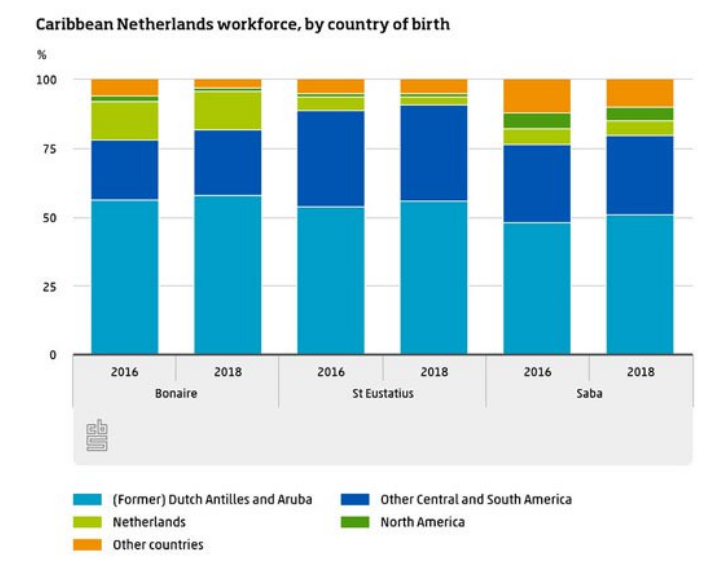
BONAIRE/SABA–In 2018, 57 per cent of the employed labour force (ages 15 to 74) in the Caribbean Netherlands were born in the (former) Netherlands Antilles and Aruba. On Bonaire, this was 58 per cent, on St Eustatius 56 per cent and on Saba 51 per cent. This is shown by the latest figures from the 2018 Labour Force Survey (LFS) conducted by Statistics Netherlands CBS.
Employers in the Caribbean Netherlands are required to make a number of mandatory efforts to fill their vacancies with local employees. Only when this is unsuccessful, they may hire staff from elsewhere outside the islands. No work permit is required for native Dutch persons from Aruba, Curaçao, St Maarten or Europe, nor for Americans. The work permit requirement does apply to people from any other country, although a few exceptions are made in certain lines of work.
In 2018, the Bonaire workforce stood at 11,200, some 500 more than in 2016. The share of people in work who were born in the Caribbean part of the Kingdom was up by one percentage point last year, to 58 per cent.
Likewise, both St. Eustatius and Saba had a larger workforce in 2018 compared to 2016, adding 250 and 190 persons respectively. Currently, St. Eustatius has a workforce of 1,900, for Saba this is 1,200. Most newly employed are people who were born in the Caribbean part of the Kingdom. In 2018, they accounted for 56 per cent of the workforce on St. Eustatius (+2 percentage points) and 51 per cent of those employed on Saba (also +2 percentage points).
In addition, the percentage share of Central and South Americans rose on all three islands; Bonaire saw a relatively sharp rise by two percentage points to 24 per cent in 2018.
The share of European Dutch persons among the workforce of Bonaire remained unchanged, and is still considerably larger than on the two other Caribbean Dutch islands. On Saba, which has an American medical university, there is also a relatively large share of US origin.
Relatively many residents who are natives of the (former) Dutch Antilles and Aruba work in business and administrative occupations. This is the case for both Bonaire (21 per cent) and the other two islands, St. Eustatius (20 per cent) and Saba (18 per cent). Among those born in the Caribbean part of the Kingdom, 16 per cent work in administration, while 22 per cent work in the civil service and in public administration.
Central and South American persons working in the Caribbean Netherlands are relatively often found in technical and service occupations. Examples are construction workers (27 per cent) or cleaners (12 per cent). Just under five per cent work as a waiter or bartender.
On Bonaire, 19 per cent of the workforce are found in technical and 15 per cent in service occupations. The respective shares for such occupations among Central and South Americans there are 38 and 26 per cent; for St. Eustatius, the shares are 35 and 20 per cent and on Saba 27 and 27 per cent.
A relatively large share of the employed persons on Bonaire who were born in the European part of the Netherlands work as managers, in (health) care and welfare, or in education. Ten per cent of the workforce are found in either care or welfare occupations; 6 per cent in teaching occupations and 6 per cent in management occupations. Among the working population of European Dutch origin, the respective shares are 16, 12 and 11 per cent.
Bron; Daily Herald


Joep Meloen
Dat zeg ik ook niet. Goed lezen s.v.p.
@ Markus
Wanneer de jeugdwerkloosheid hier zo’n 30 % bedraagt dan is het zeker niet zo dat de gehele beroepsbevolking aan het werk is.
” In 2018, 57 per cent of the employed labour force (ages 15 to 74) in the Caribbean Netherlands were born in the (former) Netherlands Antilles and Aruba” .
57% maar er staat niet bij hoeveel % dat is van de totale “Antillean” workforce. Het zou , theoretisch, ook kunnen betekenen dat 100% van de ” Antillean ” workforce aan het werk is.Volledige werkgelegenheid voor die groep dus. Het betekent in ieder geval NIET dat 43% van de ” Antillean ” workforce NIET werkt.
Het verbaast mij werkelijk absoluut niets.
Met een groot deel van de lokale bevolking die of niet gemotiveerd zijn of het werk niet serieus nemen (te laat komen, helemaal niet komen, geen productiviteit etc) is het niet vreemd dat werkgevers op zoek gaan naar personeel dat wel wil werken. En veel buitenlanders komen juist om te werken, dus dat is vrij snel bekeken. En nee, daarbij gaat het er niet om dat men zo min mogelijk wenst te betalen. Wat de werkgever zoekt is personeel dat de opgedragen taken ook uitvoert en dat ook nog eens naar behoren. Dat heeft de prioriteit en wanneer de buitenlander goed werk aflevert dan krijgt hij gewoon dezelfde beloning.
Ik denk dat we kunnen concluderen dat ‘wie wil werken’ echt wel werk kan en zal vinden en een groot deel van het volk dat werkloos thuis zit heeft het gewoon aan zichzelf te danken.
Met een jeugd, die van mening is dat zij recht hebben op een flashy auto, veel blinkend goud, een VIP box bij een evenement etc, valt er niet veel te beginnen.
Klinkt hard maar het is wel de realiteit. Gelukkig hebben diverse ministers in het verleden al exact hetzelfde gezegd, dus wie kwaad op mij wil worden zal toch echt eerst bij hen aan moeten kloppen.
Nepnieuws ?